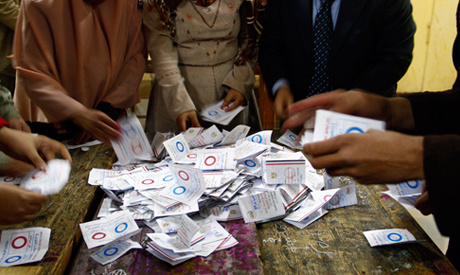Egypt Endures and Perseveres
Former president Hosni Mubarak used to hold democratic elections in Egypt. Turnout was said to be spectacularly high, putting most Western democracies' commitment to the democratic voting process to shame with their meagre turnouts of potential voters. Mr. Mubarak enjoyed such huge confidence among Egyptians that he never came away with less than the high 80s in 'yes' votes. One candidate for president, one party to vote for in the democratic process, Egypt-style.After Egypt's brief flirtation of what was billed as a truly democratic and free election with a number of ill-prepared-but-one political parties on the ballot, electing the Muslim Brotherhood candidate to office, Egypt has returned to the style that suits it best. A pre-vote, ostensibly on the new, amended Constitution that has it more reflective of Democratic values but with an Egyptian twist; its massive 'yes' vote a vote of confidence for the military and specifically General Abdel-Fattah el-Sisi.
 |
| A man holds a portrait of Egypt's Defence Minister General Abdel Fattah al-Sisi outside a polling … Photo Mahmoud Khaled, 14 January 2014, AFP |
Who, undoubtedly, blushing with pride in his runaway popularity, will offer himself expeditiously as a candidate for president in the soon-to-be-scheduled presidential election. So here it is; the future resembling the past. Egypt seems to thrive politically under the military, from the time of General Nasser, to General Sadat, to General Mubarak, and now General el-Sisi. Egypt needs a firm, guiding hand, and they will have it in General el-Sisi.
It requires a firm hand and indomitable will to meet the challenge of the equally strong-willed Muslim Brotherhood which has finally, over its 80 years of existence, of planning and of anticipation, tasted what the power of political conquest is really like, and will do whatever it takes to recapture that sweet but all-too-brief honeymoon.

Egyptian
election workers count ballots at the end of the second, final day of a
key referendum on a new constitution, inside a polling station in
Cairo, Egypt, Wednesday, Jan. 15, 2014. (Photo: Mai Shaheen)
05:13 Unofficial final results of Nile Delta's Gharbiya governorate:Yes: 1,546,042 (98.7%)No: 20,890 (1.2%)Turnout: 1,561,358 (51.68%) This figure includes voters not registered in the same governorate, unlike in the 2012 constitutional referendum when constituents were only entitled to cast ballots in their respective governorates.Turnout of 2012 constitutional referendum: (33.17%)
The results of only one governorate is more than sufficient to reflect the results of all such returns. And there you have it, Hosni Mubarak eat your heart out: 98.7% 'yes', a paltry 1.2% 'no'. Of course, the Muslim Brotherhood boycotted the vote. Yes of course, they're a proscribed organization now, legally a terrorist group, and it is unlawful and punishable by prison sentence to be a member of the Brotherhood, let alone be seen to have any measure of sympathy for their politics, but their edicts are obeyed by their followers. None of whom appear, understandably, to have voted.
Yet again a career army officer is scheduled to become the next president of Egypt. Of course, he has done a commendable job of listening to the rage of the people as they refused to be presided over by an Islamist-dedicated president whose first order of business was strengthening Islamism within Egypt, choosing to neglect all the indices of administration that make for a strong economy, safe streets, good employment opportunities, safe foreign investment.
Those already in support of the firm hand of the military came out in droves to vote. Obeying the nascent government's decree that they should and must. "This is it, we have had it. I will vote 'yes' even if it is the last thing I do", said Ismail Mustafa standing outside a Cairo polling station. And he did. And they did. Well over 98%-worth. The feeble 1.2% that did not, who choose to vote negatively are not worth anything, anyway, one supposes.
 |
| Egyptian Muslim Brotherhood supporters throw stones at voters outside a polling station / Khaled Kamel/AFP |
Of course eleven people died in the two days of voting, and that's regrettable. Given the size of the security force in place and the complexity of their job, it might have been a whole lot worse. Fear and paranoia are not pleasant emotions for an entire body of a country to be experiencing. Leading to low tolerance for dissent. Close to 400,000 military and police among the 90-million population seems guaranteed to minimize opportunity for conflict.
For now, in any event.
Labels: Conflict, Democracy, Egypt, Muslim Brotherhood, Social-Cultural Deviations

<< Home